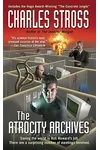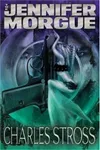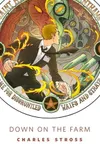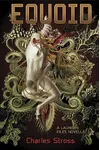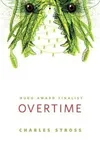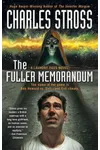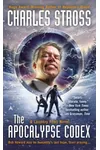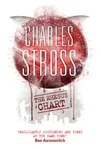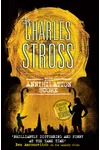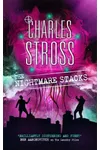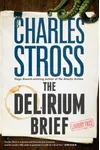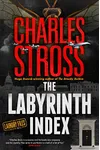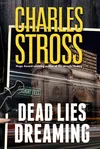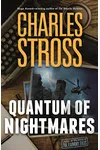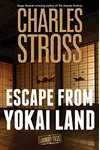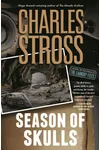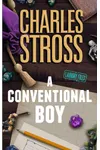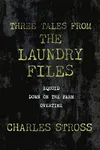Dive into the delightfully eerie world of the Laundry Files, where eldritch horrors meet office politics and spy-thriller antics! Written by Charles Stross, this genre-bending series follows Bob Howard, a former IT geek turned occult agent, as he battles cosmic nightmares and bureaucratic red tape in a secret British agency. It’s Lovecraftian horror with a side of sardonic humor, perfect for fans craving something wickedly unique.
Blending cosmic dread, Cold War espionage, and workplace satire, the Laundry Files offers a fresh spin on horror. Imagine Cthulhu crashing a PowerPoint presentation—that’s the vibe. With its clever mix of hard science fiction and dark comedy, the series has carved a cult following. Ready to explore Bob’s world of computational demonology and government forms?
How Laundry Files Began
Charles Stross, a British sci-fi and fantasy author with a knack for hard science fiction, launched the Laundry Files in 2004 with The Atrocity Archives. Inspired by H.P. Lovecraft’s Cthulhu Mythos and Cold War spy novels, Stross saw parallels between cosmic terror and espionage’s paranoia. He envisioned a world where magic is applied mathematics, and government agencies fend off otherworldly threats. Drawing from his tech background, Stross crafted Bob Howard as a relatable, tech-savvy hero navigating a universe of arcane bureaucracy.
The series grew from a novella serialized in 2001, evolving into a sprawling saga. Stross’s love for Len Deighton’s gritty spy tales, rather than James Bond’s glamour, shaped the Laundry’s stale-beer espionage flavor. His goal? To merge horror’s existential dread with the absurdity of office life, creating a universe both thrilling and hilariously mundane.
The Heart of Laundry Files
The series kicks off with The Atrocity Archives (2004), where Bob, a low-level techie, gets thrust into fieldwork to stop a dimension-hopping artifact from unleashing horrors. The Jennifer Morgue (2006) channels Ian Fleming, with Bob thwarting a billionaire’s plan to raise an eldritch entity from the sea. The Fuller Memorandum (2010) dives deeper into cosmic conspiracies, while The Apocalypse Codex (2012) introduces external agents and apocalyptic stakes. Each book blends pulse-pounding missions with Bob’s dry wit and tech ingenuity.
At its core, the Laundry Files thrives on themes of cosmic insignificance, bureaucratic absurdity, and human resilience. Magic, powered by complex equations, makes computers as potent as spellbooks, grounding the supernatural in science. The setting—a secretive British agency called the Laundry—feels like MI6 crossed with Dilbert’s cubicle hell. Stross’s sharp satire targets office politics, government inefficiency, and the fragility of human systems against incomprehensible threats, all wrapped in a darkly comedic tone.
Bob Howard, an unlikely hero, evolves from a sarcastic coder to a seasoned agent, facing eldritch gods and printer jams with equal exasperation. His relatable struggles and tech-driven problem-solving—like using a smartphone to track magical artifacts—make him a standout in urban fantasy. The series’ blend of Lovecraftian dread, spy-craft, and humor creates a world that’s as unsettling as it is addictive.
Why Laundry Files Resonates
The Laundry Files has left a tentacled mark on urban fantasy and horror, inspiring authors to mix genres with abandon. Its Hugo Awards for novellas like The Concrete Jungle and Equoid, plus nominations for Best Series, highlight its critical acclaim. Fans adore its irreverent take on cosmic horror, with online communities buzzing about Bob’s quips and the series’ inventive magic system. Its influence shines in works blending supernatural stakes with mundane realism, proving fantasy can be both epic and grounded.
The series’ lasting appeal lies in its balance of terror and levity. By pairing existential dread with office banter, Stross makes the incomprehensible approachable. As the series explores darker arcs, like the Lovecraftian Singularity in later books, it remains a cultural touchstone for fans of weird fiction and bureaucratic satire.
- First Book: The Atrocity Archives (2004)
- Total Books: 10+ novels and novellas
- Awards: Hugo Awards for The Concrete Jungle (2005), Equoid (2014)
- Author: Charles Stross, born in Leeds, England
Grab The Atrocity Archives and plunge into the Laundry Files’ world of spies, eldritch horrors, and endless paperwork. Your next favorite series awaits!
